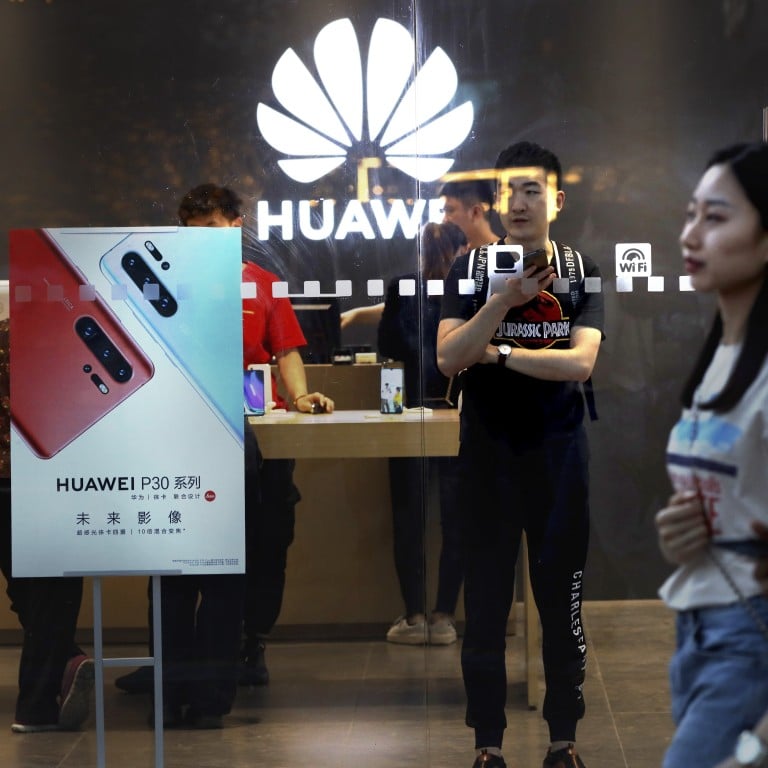
Huawei among more than 140 Chinese entities on US trade blacklist
- The Entity List identifies organisations and individuals considered to be a significant risk to US security and foreign policy
- Telecoms gear maker Huawei and 68 of its non-US affiliates were added to the trade blacklist on May 16
The US government added Huawei Technologies to a trade blacklist earlier this month, restricting the Chinese telecommunications equipment maker’s ability to buy hardware, software and services from American hi-tech suppliers.
That US blacklist, officially called the Entity List, identifies organisations and individuals believed to be involved, or pose a significant risk of becoming involved, in activities contrary to America’s national security or foreign policy interests.
In total, there are now 143 entries under mainland China in the US trade blacklist, based on a review of the existing 281-page document maintained by the Bureau of Industry and Security (BIS) under the US Department of Commerce.
The number of Chinese entities, however, remains behind those of Russia, which has 317 entries on the blacklist.
The list is subject to ongoing review and revision by the BIS, which added Shenzhen-based Huawei and 68 of its non-US affiliates on May 16.
Organisations or individuals on the Entity List are required to apply for a licence from the BIS before they export, re-export or transfer any items subject to trade restrictions, including software and other technologies from US companies. Applications for a licence, however, will be subject to a review policy of “presumption of denial”, which means that these will be denied in most cases.
While not well-known outside their industries, most of the Chinese entities found on the US trade blacklist are involved in fields such as electronics, aviation, semiconductors, engineering, and materials used for hi-tech components.
They include Beijing Automation Control Equipment Institute, Beijing Aeronautical Manufacturing Technology Research Institute, Beijing Power Machinery Institute, China Aerodynamics Research and Development Centre and China Electronic Technology Group Corp.
A number of major hi-tech components distributors are also on the Entity List. These include the likes of Tenco Technology Co, Avin Electronics Technology and Multi-Mart Electronics Technology.
Major Chinese academic institutions on the trade blacklist include the Beijing University of Aeronautics and Astronautics, Sun Yat-sen University, the National University of Defence Technology, Northwestern Polytechnical University, Sichuan University and the University of Electronic Science and Technology.
The Chinese companies on the blacklist are not limited to those from first-tier cities like Beijing and Shenzhen. The likes of Baotou Guanghua Chemical Industrial Co, located in Inner Mongolia, and Yantai Jereh Oilfield Services Group, from the coastal city of Yantai in Shandong province, are also on the Entity List.
The number of Chinese entities on the US trade blacklist, however, could increase in the event that Washington widens its dragnet to include other mainland hi-tech companies, according to a Bloomberg report last week that cited people familiar with the matter.
Chinese media raise rare earths threats after US ups trade war ante with Huawei blacklist
The US government was deliberating whether to add major surveillance systems providers Dahua Technology, Hikvision Digital Technology, Megvii, Meiya Pico and iFlytek to the Entity List, the report said.
What started out as a trade dispute, in which Washington unilaterally imposed tariffs and sparked retaliatory levies from Beijing, has escalated to broader campaigns designed to cripple China’s technology champions by cutting off their access to American hi-tech suppliers. The wide reach of US policy means that even non-US companies whose products use American technology may also be prevented from supplying to Chinese companies.
Last year, the US government initiated a crippling ban on the sale of technology to Chinese telecoms equipment maker ZTE Corp, forcing it to sue for peace by paying a US$1.2 billion fine, replacing its entire senior management and accepting a US monitor to ensure its compliance.

